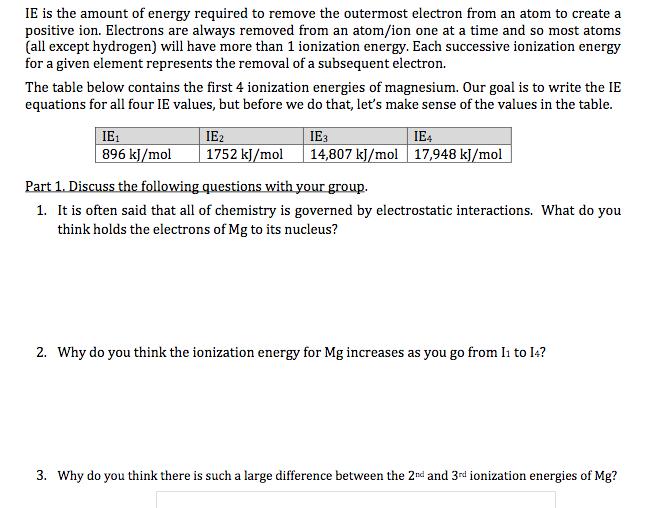Answered step by step
Verified Expert Solution
Question
1 Approved Answer
IE is the amount of energy required to remove the outermost electron from an atom to create a positive ion. Electrons are always removed

IE is the amount of energy required to remove the outermost electron from an atom to create a positive ion. Electrons are always removed from an atom/ion one at a time and so most atoms (all except hydrogen) will have more than 1 ionization energy. Each successive ionization energy for a given element represents the removal of a subsequent electron. The table below contains the first 4 ionization energies of magnesium. Our goal is to write the IE equations for all four IE values, but before we do that, let's make sense of the values in the table. IE: 896 kJ/mol IE2 1752 kJ/mol IE4 IE3 14,807 k]/mol 17,948 kJ/mol Part 1. Discuss the following questions with your group. 1. It is often said that all of chemistry is governed by electrostatic interactions. What do you think holds the electrons of Mg to its nucleus? 2. Why do you think the ionization energy for Mg increases as you go from Ii to l4? 3. Why do you think there is such a large difference between the 2nd and 3rd ionization energies of Mg?
Step by Step Solution
★★★★★
3.36 Rating (152 Votes )
There are 3 Steps involved in it
Step: 1
1 Electrons of magnesium gets attracted to the nuclear charge as we know nucleus is positively charg...
Get Instant Access to Expert-Tailored Solutions
See step-by-step solutions with expert insights and AI powered tools for academic success
Step: 2

Step: 3

Document Format ( 2 attachments)
60618495ad0d5_55474.pdf
180 KBs PDF File
60618495ad0d5_55474.docx
120 KBs Word File
Ace Your Homework with AI
Get the answers you need in no time with our AI-driven, step-by-step assistance
Get Started


